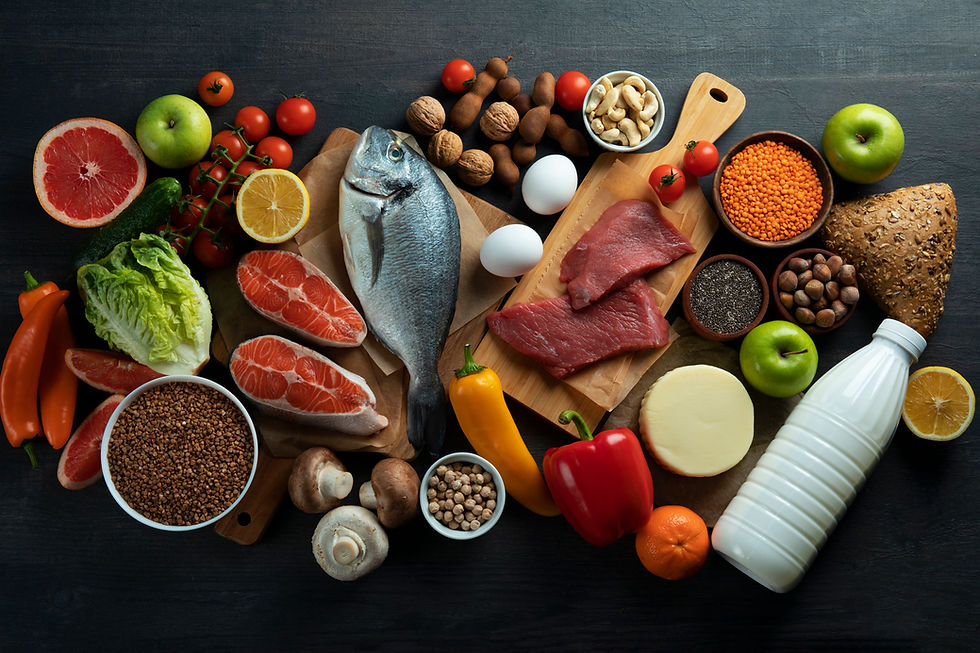Food for Athletes: Fueling Performance and Recovery
- nirmalbiz2023
- Oct 26, 2024
- 3 min read
For anyone balanced diet is absolutely necessary but when it comes to training, athletes know that a balanced intake of macronutrients and micronutrients is essential for enhancing performance, supporting endurance, and speeding up recovery. Understanding which nutrients are critical and where to find them can make a significant difference in athletic outcomes. Here’s a breakdown of the most beneficial macronutrients and micronutrients for athletes, along with some food examples.

Macronutrients
1. Carbohydrates: The Primary Energy Source
Carbohydrates are the body’s main fuel source, especially during high-intensity activities. Athletes benefit from complex carbs, which release energy gradually to help sustain endurance.
Key Sources: Whole grains like quinoa, oats, and barley; starchy vegetables like sweet potatoes and pumpkin; and legumes such as chickpeas and lentils.
Carbohydrate Benefits: Complex carbs prevent energy crashes by providing a steady energy release, ideal for prolonged physical activities.
2. Protein: Essential for Muscle Repair and Growth
Protein is vital for muscle repair and growth, making it essential for athletes engaged in intensive physical activity. Both animal and plant-based proteins are beneficial for post-workout recovery and muscle maintenance.
Key Sources: Chicken breast, turkey, salmon, eggs, Greek yogurt, tofu, quinoa, and chia seeds.
Protein Requirements: Athletes typically need 1.2-2.0 grams of protein per kilogram of body weight, depending on training intensity, to support muscle recovery and growth.
3. Fats: Sustained Energy and Joint Health
Healthy fats provide long-lasting energy, reduce inflammation, and support joint health. Omega-3 fatty acids, in particular, are known for their anti-inflammatory properties, which can aid in recovery.
Key Sources: Avocados, nuts (almonds, walnuts), seeds (chia, flax), extra-virgin olive oil, and fatty fish like salmon and sardines.
Benefits of Healthy Fats: They help with energy maintenance and play a crucial role in reducing inflammation, promoting joint health, and protecting cells during intense physical activity.
Micronutrients
1. Electrolytes: For Hydration and Muscle Function
Electrolytes are essential for hydration, especially since athletes lose these minerals through sweat. Replenishing electrolytes such as sodium, potassium, and magnesium helps maintain muscle function and prevents cramps.
Key Sources: Coconut water, electrolyte-infused drinks, bananas, oranges, spinach, and bone broth.
Hydration Tip: Regularly include these electrolyte-rich foods to maintain optimal hydration and muscle performance, particularly in hot or humid conditions.
2. Antioxidants: Combating Oxidative Stress
Strenuous exercise increases oxidative stress, which can contribute to muscle fatigue and delayed recovery. Antioxidants help combat oxidative stress, speeding up recovery and reducing muscle soreness.
Key Sources: Berries (blueberries, strawberries), dark leafy greens (kale, spinach), nuts (almonds), and dark chocolate (at least 70% cocoa).
Recovery Benefits: Foods high in antioxidants protect cells from damage and help reduce inflammation, contributing to quicker recovery post-training.
3. Iron: Oxygen Transport and Endurance
Iron is crucial for oxygen transport in the blood, making it essential for endurance and preventing fatigue. Athletes, especially female athletes, may be at risk of low iron levels, so iron-rich foods are vital.
Key Sources: Red meat, poultry, beans, lentils, dark leafy greens, and fortified cereals.
Iron Absorption Tip: Combine iron-rich foods with a source of vitamin C, such as citrus fruits, to enhance absorption.
4. Calcium and Vitamin D: Bone Health and Muscle Function
Calcium is vital for bone strength, while vitamin D supports calcium absorption and muscle function. These nutrients are especially important for athletes in high-impact sports.
Key Sources: Dairy products (milk, cheese, yogurt), leafy greens, fortified plant milks, and fatty fish (for vitamin D).
Bone Health Benefits: Adequate calcium and vitamin D intake reduces the risk of stress fractures and other bone-related injuries.
5. B Vitamins: Energy Metabolism and Muscle Repair
B vitamins play a key role in energy metabolism, helping to convert food into fuel. They are also essential for muscle repair and red blood cell production.
Key Sources: Whole grains, eggs, dairy, meat, fish, leafy greens, and legumes.
Energy and Recovery Benefits: B vitamins support energy production and red blood cell formation, helping maintain energy levels and enhancing recovery.
For peak performance, athletes need a diet rich in both macronutrients and micronutrients. By incorporating a variety of these nutrient-dense foods, athletes can support their endurance, recovery, and overall athletic potential, ensuring optimal results in both training and competition.
Comments